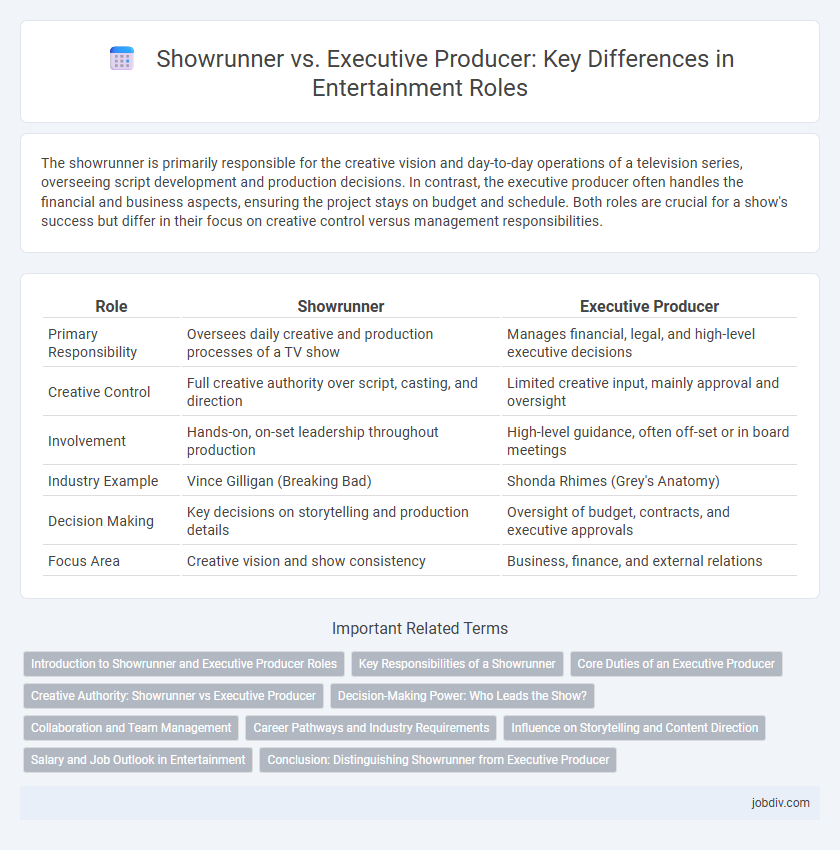The showrunner is primarily responsible for the creative vision and day-to-day operations of a television series, overseeing script development and production decisions. In contrast, the executive producer often handles the financial and business aspects, ensuring the project stays on budget and schedule. Both roles are crucial for a show's success but differ in their focus on creative control versus management responsibilities.
Table of Comparison
| Role | Showrunner | Executive Producer |
|---|---|---|
| Primary Responsibility | Oversees daily creative and production processes of a TV show | Manages financial, legal, and high-level executive decisions |
| Creative Control | Full creative authority over script, casting, and direction | Limited creative input, mainly approval and oversight |
| Involvement | Hands-on, on-set leadership throughout production | High-level guidance, often off-set or in board meetings |
| Industry Example | Vince Gilligan (Breaking Bad) | Shonda Rhimes (Grey's Anatomy) |
| Decision Making | Key decisions on storytelling and production details | Oversight of budget, contracts, and executive approvals |
| Focus Area | Creative vision and show consistency | Business, finance, and external relations |
Introduction to Showrunner and Executive Producer Roles
The showrunner acts as the primary creative force behind a television series, overseeing script development, casting, and overall production to ensure the show's vision aligns with network demands. Executive producers typically handle the business, financial, and contractual aspects, managing budgets and high-level negotiations to keep the production on track. Both roles are crucial in television production but focus distinctly on creative leadership versus executive management.
Key Responsibilities of a Showrunner
The showrunner serves as the chief creative authority on a television series, overseeing script development, casting, and day-to-day production decisions to ensure the show's vision and tone remain consistent. They manage writers' rooms, coordinate with directors, and balance network or studio demands while maintaining creative control. Unlike the executive producer, who often handles financial and business aspects, the showrunner's key responsibility is harmonizing storytelling with production logistics to deliver a coherent and engaging series.
Core Duties of an Executive Producer
An Executive Producer primarily oversees the financial and business aspects of a production, ensuring budgets are managed and funding is secured. They coordinate between studios, networks, and production teams to align creative decisions with fiscal constraints. This role involves high-level project management, contract negotiations, and maintaining overall production quality until project completion.
Creative Authority: Showrunner vs Executive Producer
The showrunner holds primary creative authority over a television series, overseeing the writing, story arcs, and overall vision. Executive producers often focus on financial, legal, and logistical aspects, with less direct involvement in daily creative decisions. While both roles are crucial, the showrunner is recognized as the key creative force driving the series' narrative and artistic direction.
Decision-Making Power: Who Leads the Show?
The showrunner holds the primary decision-making power, overseeing creative direction, script approval, and daily production operations to maintain a cohesive vision. Executive producers often manage financial aspects, secure funding, and influence high-level decisions but rarely dictate the show's creative details. This division ensures the showrunner leads the show's artistic and narrative development, while executive producers focus on business strategy and resource allocation.
Collaboration and Team Management
Showrunners and executive producers collaborate closely to steer the creative vision and manage production logistics, ensuring seamless execution of a television series. The showrunner oversees day-to-day operations, guiding writers and directors to maintain narrative cohesion, while the executive producer handles budgeting, contracts, and high-level decision-making. Effective team management relies on clear communication and aligned goals, fostering a productive environment where creative and administrative roles complement each other.
Career Pathways and Industry Requirements
Showrunners typically emerge from careers in writing and producing, combining creative oversight with managerial responsibilities to guide a TV series' vision from script to screen. Executive producers often come from diverse backgrounds, including finance, development, or senior production roles, focusing on high-level decision-making, securing funding, and maintaining industry relationships. Both roles demand strong leadership, extensive experience in television production, and a deep understanding of narrative structure and audience engagement strategies.
Influence on Storytelling and Content Direction
The showrunner holds primary creative control over storytelling and content direction, shaping the narrative, tone, and character development in a television series. Executive producers often provide overarching guidance, financial backing, and strategic decisions but typically have less involvement in day-to-day narrative choices. The showrunner's vision directly impacts script rewrites, casting, and episode pacing, making them the central figure in crafting the show's artistic identity.
Salary and Job Outlook in Entertainment
Showrunners typically earn higher salaries than executive producers, with averages ranging from $200,000 to $500,000 annually due to their comprehensive control over a show's creative and production aspects. Executive producers, while vital in securing funding and overseeing overall project management, generally see salaries between $100,000 and $300,000. Job outlook for showrunners remains competitive but promising, driven by the growing demand for original content on streaming platforms, whereas executive producers benefit from broader industry experience applicable across various production scales.
Conclusion: Distinguishing Showrunner from Executive Producer
The showrunner serves as the chief creative force behind a television series, overseeing script development, casting, and daily production decisions. The executive producer primarily manages financial, marketing, and contractual aspects, ensuring the project stays on budget and schedule. Understanding this distinction clarifies the unique yet complementary roles each plays in bringing a television show from concept to screen.
Showrunner vs Executive Producer Infographic

 jobdiv.com
jobdiv.com